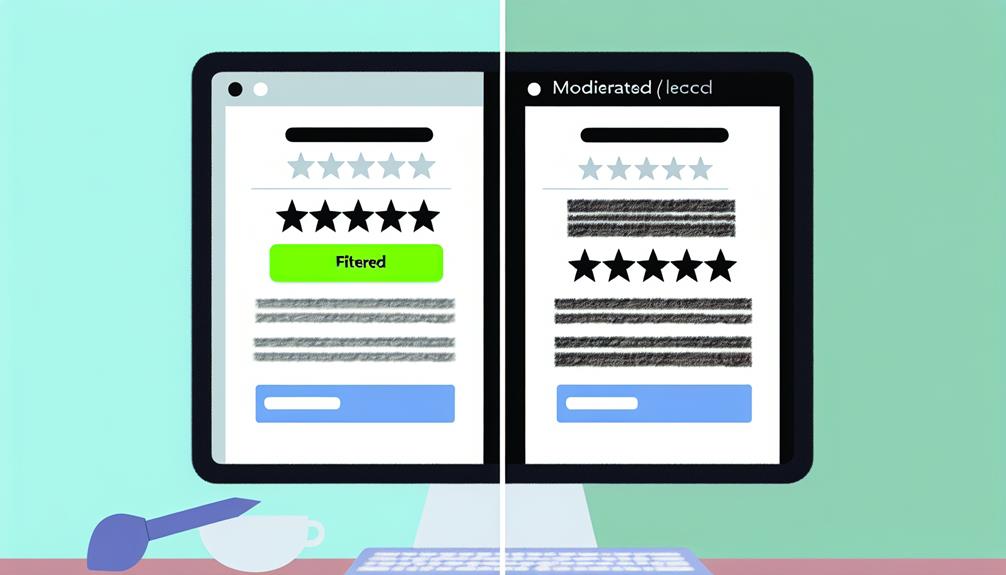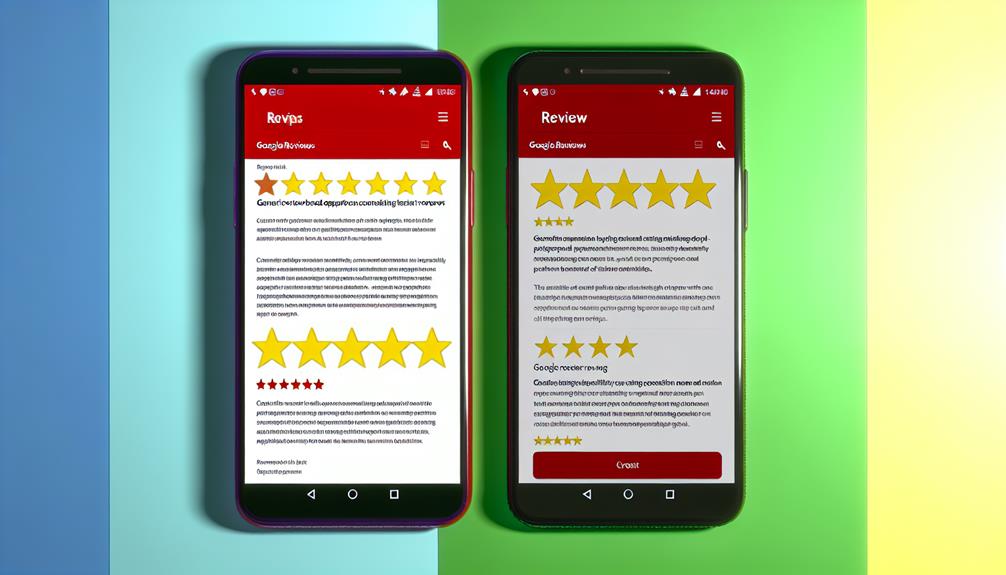When it comes to deciding between Yelp and Google reviews, a nuanced analysis is imperative to ascertain their respective strengths and limitations. While both platforms boast a vast collection of user-generated reviews, the quality and reliability of these reviews often become a focal point of comparison. Factors such as review quantity, diversity, authenticity, trustworthiness, filtering, and visibility play a pivotal role in shaping the overall perception of a business.
However, the question lingers: In the realm of online reviews, which platform truly reigns supreme in providing consumers with the most informative and credible insights?
Key Takeaways
- Yelp's biased filtering and younger audience influence review credibility.
- Google's transparent reviews cater to a broader age range, enhancing trust.
- Both platforms use algorithms and human moderation for review authenticity.
- Positive reviews on Yelp and Google directly impact business success and revenue.
Review Quantity and Diversity

When comparing review quantity and diversity between Yelp and Google, it becomes evident that both platforms offer unique advantages and challenges for consumers and businesses alike. Yelp tends to attract a younger demographic, with a higher percentage of users aged between 18 to 34, making it a popular choice for millennials seeking reviews. In contrast, Google tends to have a broader user base, appealing to a wider range of age groups, including older populations. This difference in review demographics can influence the types of opinions and experiences shared on each platform.
Review bias is another critical factor to consider when evaluating review quantity and diversity on Yelp and Google. Yelp has faced scrutiny in the past for its review filtering algorithm, which some businesses claim unfairly hides positive reviews and highlights negative ones. This bias can impact the overall perception of a business and affect consumer trust in the platform. On the other hand, Google's review system generally allows for a more transparent view of all reviews, regardless of their sentiment. However, this can also lead to challenges in filtering out fake or biased reviews, potentially affecting the overall reliability of the platform.
Review Authenticity and Trustworthiness
Given the varying review demographics and biases associated with Yelp and Google, the discussion now shifts towards evaluating the authenticity and trustworthiness of reviews on both platforms.
- Review accuracy verification: One key aspect of assessing review authenticity is verifying the accuracy of the information provided. Yelp and Google employ different mechanisms to ensure that reviews are genuine and reflect real customer experiences. Yelp, for example, has a strict review monitoring system that checks for suspicious patterns or fake reviews. On the other hand, Google uses algorithms to detect and filter out fake reviews based on various criteria.
- Trust signals assessment: Trust signals play a crucial role in determining the trustworthiness of reviews. These signals may include the reviewer's activity level, the consistency of their reviews, and whether they have a verified purchase or visited the business. Both Yelp and Google provide users with information about the reviewers, such as the number of reviews they have written and their profile completeness, to help users gauge the credibility of the feedback.
- Review response rate evaluation: Another factor to consider is the response rate to reviews by businesses. A high response rate indicates that the business is engaged with its customers and values their feedback. This can contribute to the overall trustworthiness of the reviews on a platform.
- Community feedback consideration: Platforms that allow users to upvote or downvote reviews based on their helpfulness can also enhance the trustworthiness of reviews. Community feedback mechanisms help surface the most relevant and reliable reviews for other users, increasing the overall authenticity of the platform.
Review Filtering and Moderation

To enhance the quality and reliability of reviews on online platforms, robust review filtering and moderation processes are essential components. Algorithm accuracy plays a crucial role in ensuring that only authentic and trustworthy reviews are displayed to users. Online review platforms like Yelp and Google employ sophisticated algorithms to filter out fake or biased reviews. These algorithms analyze various factors such as the reviewer's history, language patterns, and the timing of reviews to detect any signs of manipulation.
Bias detection is another critical aspect of review filtering and moderation. Online platforms use advanced algorithms to identify and flag reviews that seem to be biased or incentivized. By detecting bias, these platforms can provide users with a more balanced and unbiased view of a business or product. Moreover, review filtering and moderation processes help maintain the integrity of the platform and build trust among users.
While algorithm accuracy and bias detection are essential, human moderation also plays a significant role in ensuring the quality of reviews. Human moderators can manually review flagged reviews, investigate any suspicious activity, and make informed decisions to maintain the credibility of the platform. The combination of algorithmic filtering and human moderation is key to creating a trustworthy and reliable online review environment for users seeking genuine feedback.
Review Visibility and Impact
Enhancing the visibility and understanding of reviews can significantly impact consumer decisions and shape the reputation of businesses on online platforms. Reviews play a crucial role in influencing potential customers and can directly impact sales and revenue. Businesses that actively manage and respond to customer feedback can leverage reviews to their advantage, establishing trust and credibility in the eyes of consumers.
- Increased Trust: Positive reviews that are visible and easily accessible can help build trust with potential customers, encouraging them to choose one business over another.
- Improved Reputation: Reviews can shape the overall reputation of a business, influencing how it is perceived by the public and impacting its success in the market.
- Direct Impact on Sales: Positive reviews can lead to increased sales and revenue, as consumers are more likely to purchase products or services from highly rated businesses.
- Insightful Customer Feedback: Reviews provide valuable insights into customer experiences, allowing businesses to identify areas for improvement and tailor their offerings to meet customer expectations.
Businesses that actively engage with reviews and take steps to address feedback can not only improve their online reputation but also drive positive impacts on their bottom line. By prioritizing review visibility and understanding their impact on sales, businesses can leverage customer feedback to foster growth and success in the competitive online marketplace.
Review Response and Interaction

Engaging with customer reviews through timely and thoughtful responses can profoundly impact a business's online reputation and customer relationships. Responding to reviews shows that a business values its customers' feedback, whether positive or negative, and is actively working to address their concerns. This interaction not only enhances the business's credibility but also fosters a sense of trust and loyalty among customers.
When it comes to response engagement, businesses can take different approaches based on the type of feedback received. The table below outlines some strategies for responding to customer reviews effectively:
| Type of Review | Response Strategy |
|---|---|
| Positive Review | Thank the customer for their kind words and loyalty. |
| Negative Review | Apologize for any issues and offer a solution or compensation. |
| Neutral Review | Acknowledge the feedback and express a willingness to improve. |
| Fake Review | Politely address the concerns and request further information. |
Frequently Asked Questions
How Do Yelp and Google Handle Reviews That Violate Their Terms of Service?
Review moderation is a crucial aspect for both Yelp and Google to maintain the quality of their platforms. When reviews violate terms of service, both companies take action by removing the offending content and potentially penalizing the user responsible.
User feedback plays a significant role in improving review moderation processes, allowing these platforms to continuously refine their approach and provide a more reliable experience for their users.
Are There Any Differences in the Demographics of Users Who Leave Reviews on Yelp Versus Google?
When examining user engagement and platform preferences between Yelp and Google, disparities in demographics of reviewers surface. Yelp tends to attract younger, urban individuals focused on lifestyle and food.
In contrast, Google garners a broader audience, including older users seeking information on various services.
These distinctions influence the content and tone of reviews, shaping the overall user experience and utility of each platform.
Do Yelp and Google Prioritize Certain Types of Businesses or Industries in Their Review Algorithms?
Review bias and industry influence can be significant factors in how Yelp and Google prioritize businesses in their review algorithms. Transparency and accountability in these algorithms are crucial to understanding how certain types of businesses are favored over others.
Can Businesses Pay to Have Negative Reviews Removed or Hidden on Yelp or Google?
Review manipulation is a concern for businesses seeking to control their online reputation. While both Yelp and Google have policies against paid removals of negative reviews, some businesses may attempt to circumvent these rules.
It is important for businesses to focus on providing quality products and services to ensure positive reviews, rather than resorting to unethical practices. Transparency and authenticity in managing reviews are key to building trust with customers.
How Do Yelp and Google Prevent Fake Reviews From Being Posted on Their Platforms?
Yelp and Google employ sophisticated algorithms and manual verification processes to ensure review authenticity and prevent fake reviews on their platforms. They analyze various data points such as IP addresses, writing styles, and user behavior to detect anomalies that may indicate fraudulent activities. Additionally, both platforms encourage users to report suspicious reviews for further investigation.
Conclusion
In conclusion, while both Yelp and Google reviews have their strengths and weaknesses, it ultimately depends on the individual's preferences and needs.
Yelp may have a larger quantity and diversity of reviews, but Google may offer more authentic and trustworthy reviews.
Both platforms have their own filtering and moderation systems in place, but Google reviews may have a wider reach and impact.
Ultimately, the choice between Yelp and Google reviews will depend on the specific priorities and criteria of the user. Which platform aligns more closely with your review needs?

